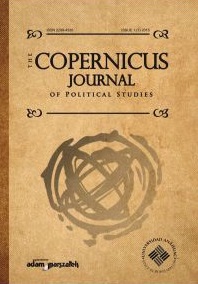British Party System Change. The Impact of Changing Voters, Devolution and Cabinet Coalition on the Two-Party System
DOI:
https://doi.org/10.12775/cjps.2014.01.02Słowa kluczowe
British party system, coalition government, devolution, general elections, political participationAbstrakt
The article describes the analysis of the modern British party system in the age of changes and transformations. In particular, it analyzes the changes in the electorate as well as the legal-institutional conditions which, in consequence, led to a shift in the balance of power between the political parties on the parliamentary level that occurred after the 2010 general election. Forming a coalition in the Parliament and the Cabinet marked the beginning of an ideologically and politically difficult rule of two parties which both politicians and voters alike had to learn. I argue that the above circumstances led to a certain “crisis” not only in the way administration is handled but also in the society’s political participation. Simultaneously, it relates to what I view as a change in the British party system. The present article largely focuses on the transformations within the British party system that occurred in the early 21st century, on the genesis of the processes which affects the transformations in the above system, as well as on the causes and effects of these phenomena.
Bibliografia
Dwadzieścia tysięcy studentów na ulicach. Bili się z policją (Twenty Thousand Students Went to the Streets. Clashes with the Police). Money.pl. Retrieved from http://news.money.pl/artykul/20;tysiecy;studentow;na;ulicach;bili;sie;z;policja,181,0,732085.html (March 23, 2013).
Antoszewski, A. (2004). Wzorce rywalizacji politycznej we współczesnych demokracjach europejskich. Wrocław: Wydawnictwo Uniwersytetu Wrocławskiego.
Antoszewski, A. & Herbut, R. (2006). Systemy polityczne współczesnej Europy. Warszawa: Wydawnictwo Naukowe PWN.
AV referendum: No vote a bitter blow, says Clegg. BBC. Retrieved from http://www.bbc.co.uk/news/uk-politics-13311118 (June 20, 2013).
Bardi, L. & Mair, P. (2008). The Parameters of Party Systems. Party Politics, 14 (2), pp. 147–166.
Blondel, J. (1990). Types of Party Systems. In P. Mair (Ed.), The West European Party System (pp. 302–310). Oxford: Oxford University Press.
Bogdanor, V. (2001). Devolution in the United Kingdom. Oxford: Oxford University Press.
Brytyjczycy nie chcą oszczędzać. 150 tys. ludzi na ulicach Londynu (The British People Do Not Want to Save Money. 150 Thousand on the Street of London). TVN24.pl. Retrieved from http://www.tvn24.pl/wiadomosci-ze-swiata,2/brytyjczycy-nie-chcaoszczedzac- 150-tys-ludzi-na-ulicach-londynu,283951.html (March 23, 2013).
Collett, P. (2011). David Cameron and Nick Clegg’s body language shows solidarity. The Guardian. Retrieved from http://www.theguardian.com/politics/2011/may/12/cameron-clegg-body-language-solidarity (March 23, 2013).
Duverger, M. (1965). Political parties. Their organization and activity in the modern state. New York: John Wiley & Sons.
The Electoral System for the Scottish Parliament. The Scottish Parliament. Retrieved from http://www.scottish.parliament.uk/visitandlearn/Education/16285.aspx (February 2, 2014).
Gallagher, M. (2014). Election indices. Retrieved from http://www.tcd.ie/Political_Science/staff/michael_gallagher/ElSystems/Docts/ElectionIndices.pdf (August 30, 2014).
Heath, O. (2011). The great divide: voters, parties, MPs and expenses. In N. Allen & J. Bartle (Eds.), Britain at the polls 2010 (pp. 121–126). London: SAGE Publications Ltd.
Hopkin, J. & Bradbury, J. (2006). British Statewide Parties and Multilevel Politics. Publius, 36(1), pp. 135–152.
How the Assembly is elected. National Assembly for Wales. Retrieved from http://www.assemblywales.org/abthome/role-of-assembly-how-it-works/abt-assembly-elections-2/abt-nafw-how-assembly-elected.htm (February 2, 2014).
Kaczorowska, M. (2007). Dewolucja systemu politycznego: istota, wpływ i znaczenia – casus Zjednoczonego Królestwa Wielkiej Brytanii i Irlandii Północnej. In J. Szymanek, M. Kaczorowska & A. Rothert (Eds.), Ewolucja, dewolucja, emergencja (pp. 118–145). Warszawa: Dom Wydawniczy Elipsa.
Ingle, S. (2008). The British party system. London: Routledge.
Laakso, M. & Taagepera, R. (1979). Effective Number of Parties: A Measure with Application to West Europe. Comparative Political Studies, 12, pp. 3–27.
La Palombara, J. & Weiner, M. (1966). Political Parties and Political Development. Princeton: Princeton Univeristy Press.
Lijphart, A. (1984). Democracies: Patterns of Majoritarian and Consensus Government In Twenty One Countries. New Haven: Yale University Press.
Lynch, P. & Garner, R. (2005). The changing party system. Parliamentary Affairs, 58(3), pp. 533–554.
Lynch, P. (2007). Party System Change in Britain: Multi-Party Politics in a Multi-Level Polity. British Politics, 2, pp. 323–346.
Mair, P. (1996). Party system change, Oxford: Oxford University Press.
Mayer, L. (1980). A Note on Aggregation of Party systems. In P. H. Merkl (Ed.), Western European Party Systems (pp. 515–520). New York: Free Press.
Northern Ireland Assembly. About My Vote. Retrieved from http://www.aboutmy vote. co.uk/what_can_i_vote_for/northern_ireland_assembly.aspx (February 2, 2014).
Quinn, T. (2012). From Two-Partism to Alternating Predominance: The Changing UK Party System, 1950–2010. Political Studies, 61 (pp. 378–400).
Robins, L., Blackmore H. & Pyper, R. (1994). Britain’s Changing Party System, London: Pinter.
Siaroff, A. (2000). Comparative European Party Systems. An Analysis of Parliamentary Elections Since 1945. New York–London: Routlegde.
Smith, G. (1980). Politics in Western Europe: a Comparative Analysis. London: Heinemann.
Sobolewska-Myślik, K. (2012). Partie i systemy partyjne na poziomie regionu. Przykład Szkocji i Katalonii. Kraków: Wydawnictwo Naukowe Uniwersytetu Pedagogicznego.
UK-wide referendum on the Parliamentary voting system (Final national results), The Electoral Commission. Retrieved from http://www.electoralcommission.org.uk/findinformation- by-subject/elections-and-referendums/past-elections-and-referendums/ referendums/2011-UK-referendum-on-the-voting-system-used-to-elect-MPs (June 20, 2013).
Webb, P. (2000). The Modern British Party System, London: Sage.
Zięba, A. (1996). Zagadnienia systemu partyjnego Wielkiej Brytanii. In M. Grzybowski & A. Zięba (Eds.), Współczesne systemy partyjne państw europejskich (pp. 11–38). Kraków: Uniwersytet Jagielloński.
Zuba, K. (2012). Brytyjski system partyjny w XXI wieku – ciągłość czy zmiana? Annales Universitatis Mariae Curie-Skłodowska Lublin-Polonia, 19(1), pp. 99–100.
Pobrania
Opublikowane
Jak cytować
Numer
Dział
Statystyki
Liczba wyświetleń i pobrań: 402
Liczba cytowań: 0



